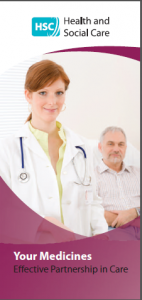The use of medicines has transformed care for patients. Patients and their carers have a vital role to play in managing medicines and being involved in making decisions about care.
 |
In establishing an effective partnership in managing medicines with the prescriber, you as a patient/carer need to be fully informed. If you feel you haven’t received sufficient information or if you simply wish to find out more about your role, please read this carefully and, if necessary, seek further advice from your doctor nurse or pharmacist.
|
Definition of a medicine
What can I do next if I have questions or need more information?
What is a licensed medicine?
What information should a prescriber provide?
Prescribers must adhere to strict professional standards when they prescribe a medicine and always answer questions that you may have in relation to medicines prescribed. When medicines are prescribed, in order to establish an effective partnership, you must be given sufficient information to allow you to make an informed decision. This should include:
- What are the benefits?
- What other treatment options are available?
- Whether the medicine is licensed or unlicensed?
- The dose and frequency of medicine to be taken?
- How long the medicine should be taken for?
- Potential risks and side effects of the medicine?
Further information:
Professional standards for doctors, nurses and pharmacists:
General Medical Council (GMC) www.gmc-uk.org
Nursing and Midwifery Council (NMC) www.nmc-uk.org
General Medical Council (GMC) www.gmc-uk.org
Nursing and Midwifery Council (NMC) www.nmc-uk.org
Pharmaceutical Society of Northern Ireland (PSNI) www.psni.org.uk
Reporting Side Effects of Medicines-yellow card scheme www.yellowcard.mhra.gov.uk
Information on Medicines:
British National Formulary – includes children (registration required) www.bnf.org
Electronic Medicines Compendium www.medicines.org.uk
Medicines for children – practical advice www.medicinesforchildren.org.uk

